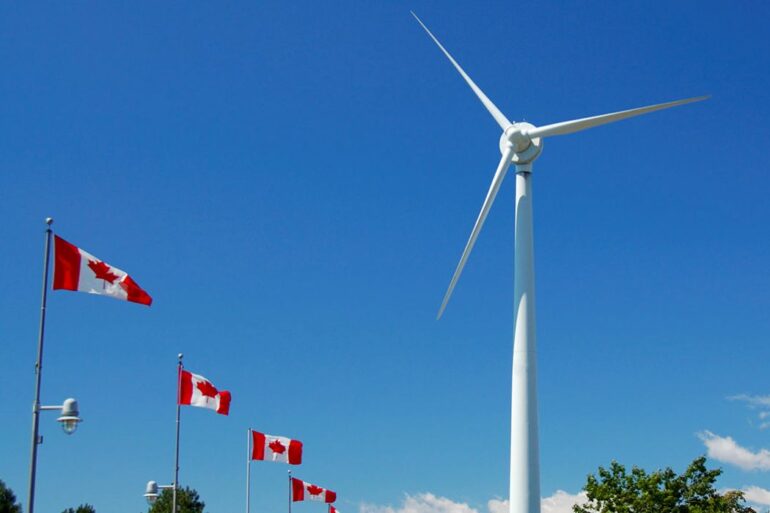Canada’s cleantech sector has worked hard to earn its reputation as a global leader, but while the US pumps billions into the industry Canadian regulators have been dragging their heels, and experts warn that it’s causing homegrown innovation to migrate south.
According to a report by the Boston Consulting Group, Canada is home to 12 of the top 100 cleantech ventures in the world, while private investment in the sector has increased four-fold since before the pandemic. However, the study also found that only 17 percent of climate tech investor dollars remain in Canada, with the vast majority flowing into the United States.
In August of 2022, the Biden Administration passed its landmark Inflation Reduction Act (IRA), which dedicated $370 billion to green energy investments. Canada, which has historically punched well above its weight class in clean energy innovation, now finds itself falling behind.
“We’re not going to compete on a dollar-for-dollar basis against a country with a population 10 times our size,” said Canadian MP and Conservative Party Deputy Leader Melissa Lantsman during a Q&A session at Collision, a global technology conference held in Toronto this week. “We’ve got 16 projects on the Prime Minister’s desk, not one of them approved, and we’ve got the resources countries would dream of having, but an inability to get products out the door.”
Ms. Lantsman’s comments echo those of other tech industry leaders who are increasingly vocalizing frustration with the federal government’s more gradual approach to funding cleantech innovation. Just a couple of weeks prior Ernst & Young partner Sean Verret warned of Canada’s inability to keep up with the American cleantech sector in the wake of the IRA during a panel at Vancouver Startup Week.
“Nobody can match what the USA has done with their IRA program. It’s not matchable; there’s just not the capital available,” he said, warning that Canadian cleantech organizations are being lured south of the border. “I’m not sure in Canada we have a real response right now.”
The Canadian government has promised to offer a range of tax benefits to help prop up the sector, but those commitments have languished in regulatory limbo, according to Bryan Watson, an SVP at Venbridge and managing director of CleanTech North.
“What [the IRA] did was it accelerated the launch of a lot of the cleantech tax credits in Canada,” said Watson, who spoke to BetaKit at Collision. “It accelerated the press release, the launch, the budget item — but right now we’re being slow to roll those things out.”
Watson explained that in the weeks and months that followed America’s plans for cleantech investment a series of tax credits were announced in Canada as part of Budget 2023. They include a 15 percent Clean Electricity Investment Tax Credit; a 30 percent Clean Technology Manufacturing Tax Credit, and a Clean Hydrogen Investment Tax Credit of Between 15 and 40 percent. It also included expansions of the Carbon Capture, Utilization, and Storage Investment Tax Credit, and the Clean Technology Investment Credit.
RELATED: Federal budget a “huge win” for cleantech, but Canada still at risk of missing out
While the $60 billion suite of incentives is certainly welcome by the country’s cleantech sector, Watson says the specifics on who and what qualifies for those credits has yet to be defined.
“We’re still waiting for the tax code changes—for finance to hand it to the CRA to say ‘here’s how you can actually accrue those tax credits,’” he said. “A business can’t invest tens or hundreds of millions of dollars not knowing whether they’re going to get a 40 percent tax credit on just the hydrogen electrolyzer, or some of the other parts, what pieces of that project are actually going to be covered.”
Watson adds that consultations are ongoing, and he is hopeful that an announcement offering specifics is forthcoming. At the same time, he says that these tax credits have been in limbo since they were first introduced as part of budget 2022, and warns that each passing day adds to the lost opportunity costs of Canada’s cleantech sector, and the economy at large.
“I absolutely know of companies that have opened up more manufacturing [in the U.S.] because of it, instead of here,” Watson said. “There are people that are manufacturing components in the cleantech ecosystem that are looking at it going, ‘I was going to open another plant, as a proud Canadian company I want to build it here, but [In the U.S.] they’re giving me a tax credit for the manufacturing, and this part and that.’”
Canada spent years establishing a reputation as a global leader in the cleantech ecosystem, but Watson warns that until the federal government offers specifics about its clean energy tax credits the country will continue to lose innovation, talent, and investment to the U.S.
“I would like us to maintain a dominant position in this market that we can own because we’ve got such a good stable of companies here, punching above our weight already,” he says. “I’d hate to see us lose the traction that we’ve gained over many years of just being scrappy in the cleantech industry.”
Featured image Stacey Newman via Getty Images


